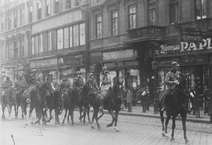(Project: Arabs, Turks and Iranians)
Nader Habibi
Neighboring countries in many regions of the world have negative feelings toward each other. Negative attitudes that are rooted in historical memories of past wars and atrocities, racial and ethnic jealousy, and competition for power and domination in the same neighborhood. When we look at the history of various regions of the world, it is not an error to claim that, up until World War II, no region had experienced more war and violence than Europe. Yet, after experiencing the devastating destruction of two World Wars in the first half of 20th century, the Europeans were able to overcome their deep animosities and develop close ties with one another.[caption id="attachment_222" align="alignleft" width="212"]
 Romanian Cavalry in Budapest during the Hungarian-Romanian War of 1919[/caption]
Romanian Cavalry in Budapest during the Hungarian-Romanian War of 1919[/caption]They have managed to create the European Union and propagate a pan-European cultural identity among a large segment of each member-nation's citizens. The French, the Germans and the British still feel very competitive toward each other but they have managed to channel those competitive feelings away from bloodshed and into athletic, artistic, scientific and industrial competition.
Surrounded by two superpowers (the United States and the former USSR), they have realized that cooperation and unity is the only way that they can remain relevant and competitive as a continent. The historical grievances and cultural hatreds among Arabs, Turks and Iranians, are no worse than the French, British and Germans in 19th and first half of 20th centuries. If Europeans have been able to transform those deep rooted animosities into productive competition and a strong European identity, then perhaps their success can serve as a lesson for the ATI.
***
When the United Kingdom was more advanced than Germany in early 19th century, the British had very negative and demeaning attitudes toward Germans. In early 19th century the British traveller, John Russell visited Germany several times and made some negative descriptions about the character of German people. In his travel book titled: wrote a book about his travels to Germany. Here is a quote from page 228 of his book : A tour in Germany, and some of the southern provinces of the Austrian Empire,
in the years 1820, 1821, 1822.
".....nded, plodding,
easily contented people. Like all their brethren of
the north of Germany, without possessing less kindness
of heart, they have much less jovialty, less of the good
fellow, than the Austrians, and are not so genial and
extravagant, even in their amusements, as the Bavarian or Wirtem ..." page 228.
People to People connections among Europeans: A model for ATI connectivity? In every country there are several subcultures. The most common life style subcultures in ATI are religious and secular lifestyles. In the political domain you find a right (capitalist) and left (labor) divide. When we look at the relations between France and England what we observe is that people in these countries connect with one another based on their shared sub-culture. For example the environmental movement in France and the UK cooperate with one another. The conservative advocates of free enterprise cooperate want one another to influence policy in both countries. In other words, a shared subculture allows for connectivity across borders among European countries. The political elite that governs each country cannot disrupt this connectivity.
Unfortunately this connectivity is missing among ATI. Nationalism and distrust among ATI is so strong that subcultures cannot or will not connect based on shared values. Environmentalists in Turkey, for example, are more interested in connecting with environmental groups in Europe and earning recognition among Western nations than cooperating with Arab and Iranian environmental movements. The same is true for the environmental movement in the Arab world and Iran.
We observe a similar lack of connection among political organizations which share a common ideology (perhaps with the exception of Islamic Brotherhood.) For example the labor movement or the advocates of labor rights in Iran and Turkey have little interaction or mutual support. There is indeed very little mutual interest among these similar sub-cultures in across Middle Eastern countries. To promote ATI unity members of a subculture in each ATI country must connect with their counterparts in other ATI countries.
Experience of Japan in Asia: In early 20 Century Japan wanted to unite Asia again Western Imperialism. It resorted to militarism and wanted to achieve unity by domination and force. It occupied Korea, China, Indonesia and many other regions. Japanese had developed a sense if superiority toward other Asian civilizations and looked down on others such as Chinese. This attitude contributed to Japan's failure as the people of other Asian countries rose against Japanese occupation and colonialism. The lesson for ATI is that if one group (for example the Turks) approach the other two from a position of superiority and with the expectation of regional domination, they will fail because the other two will resist and push back against this behavior. This will result in more division and more destructive geopolitical competition among the three groups. European powers have achieved unity after WWII by developing a fair and equitable European Union with democratic institutions.

